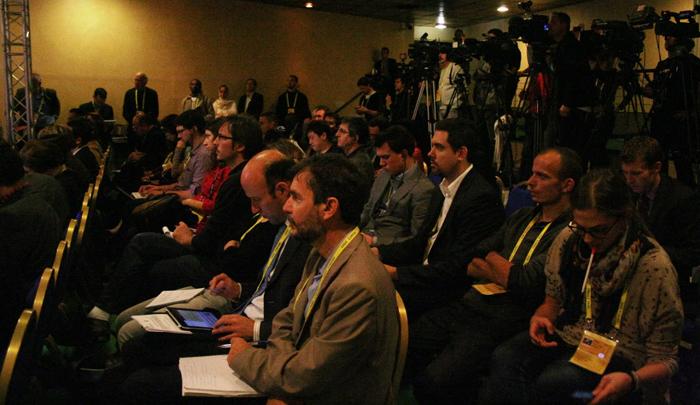
Washington, DC (November 12, 2014) — World leaders must look beyond GDP growth numbers to the human impact of their economic reform commitments, international aid and development organization World Vision said Wednesday.
In the countdown to the Brisbane G20 Leaders Summit World Vision’s CEO in Australia, Tim Costello, said global policy makers should ensure those at risk of being excluded from the benefits of growth are not left behind.
“Economic growth that only benefits the already wealthy is not going to make the world a more stable, fair and just place,” Mr. Costello said. “The most vulnerable — especially children and people living in extreme poverty — need to be considered by those with the power to shape the world economy.”
Mr. Costello — who is also chair of the official civil society G20 engagement group, the C20 — said one of the key levers available to the leaders of the world’s largest economies is their governments’ massive purchasing power.
World Vision’s report on child labor exploitation — released earlier this year — provides a roadmap for the G20 to address the abuse and loss of childhood which is the reality for the world’s 168 million child laborers.
The Creating markets for child-friendly growth report urges the G20 to protect the world’s children from the economic exploitation often concealed within global value chains.
World Vision’s Global Policy Director Kirsty Nowlan said G20 nations represent 85 percent of global GDP and are ideally placed to challenge the economic drivers which encourage child labor exploitation.
“Economies which turn a blind eye to the exploitation of children are condemning individuals, families and communities to a bleak future,” Dr. Nowlan said. “They are bypassing opportunities to improve job prospects for older youth and adults, depressing adult wages and standing by while tens of millions of children are excluded from developing to their potential.”
“In the world today, one in 10 children over five labor to the detriment of their health and development — working instead of going to school, and in many cases, in hazardous and intolerable conditions — and 44 percent of them are between five and 11 years old,” Dr. Nowlan said.
“Today’s reality is that the goods purchased by governments and individual consumers alike are increasingly ‘made in the world’ via long and complex global value chains. Persistent pressures to create products at the lowest possible price and the fragmentation of production processes means that child labor can be hidden at virtually any stage of production.”
The report sets out the need for a common approach to identifying, reporting and addressing child labor in the value chains of the $10 to $15 trillion worth of goods and services that G20 governments are expected to purchase in 2014.
Dr. Nowlan said she was encouraged by the response of the G20’s Labor and Employment Ministers’ group to the concerns raised by World Vision.
Following their meeting in Melbourne in September, the Labor Ministers committed to prioritizing measures to eliminate forced and child labor.
“We now need to see that commitment translate into a common approach to identifying, reporting and addressing child labor in the value chains of the $10 to $15 trillion worth of goods and services that G20 governments are expected to purchase in 2014,” Dr. Nowlan said.
World Vision is also calling on the G20 to include developing nations in the formulation and rollout of economic reforms which boost inclusive growth.
A strong commitment to global tax reform which would improve the ability of developing nation governments to provide basic services for their citizens is also crucial to underpin sustainable growth and allow greater investment in the health and education of hundreds of millions of people.
– END –
About World Vision:
World Vision is a Christian humanitarian organization conducting relief, development, and advocacy activities in its work with children, families, and their communities in nearly 100 countries to help them reach their full potential by tackling the causes of poverty and injustice. World Vision serves all people regardless of religion, race, ethnicity, or gender. For more information, please visit www.WorldVision.org/media-center/ or on Twitter @WorldVisionUSA.
Highlights
- World leaders must look beyond GDP growth numbers to the human impact of their economic reform commitments.
- In the countdown to the Brisbane G20 Leaders Summit global policy makers should ensure those at risk of being excluded from the benefits of growth are not left behind.